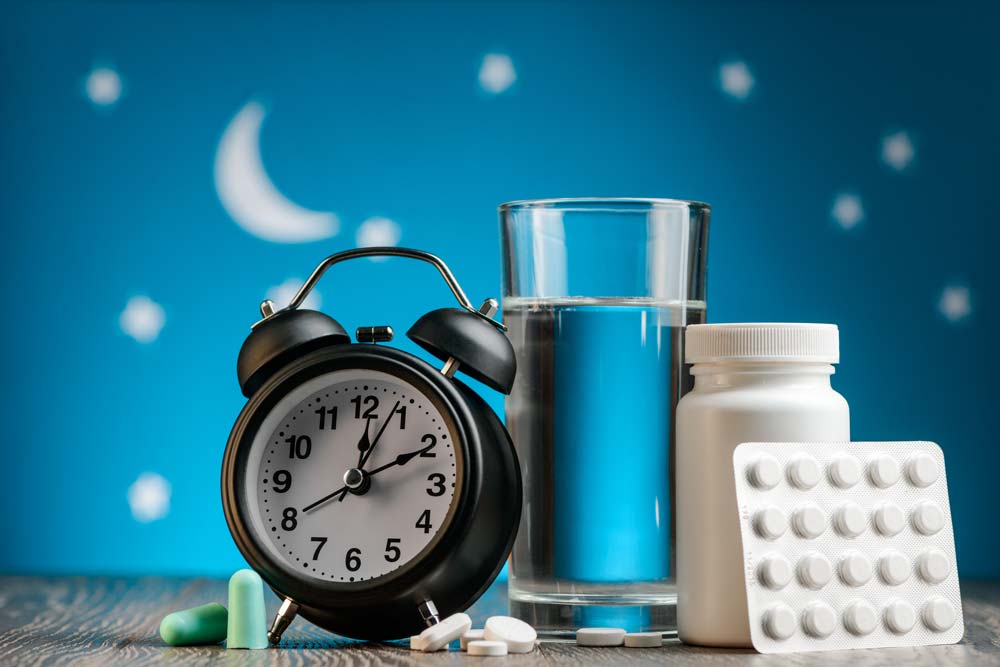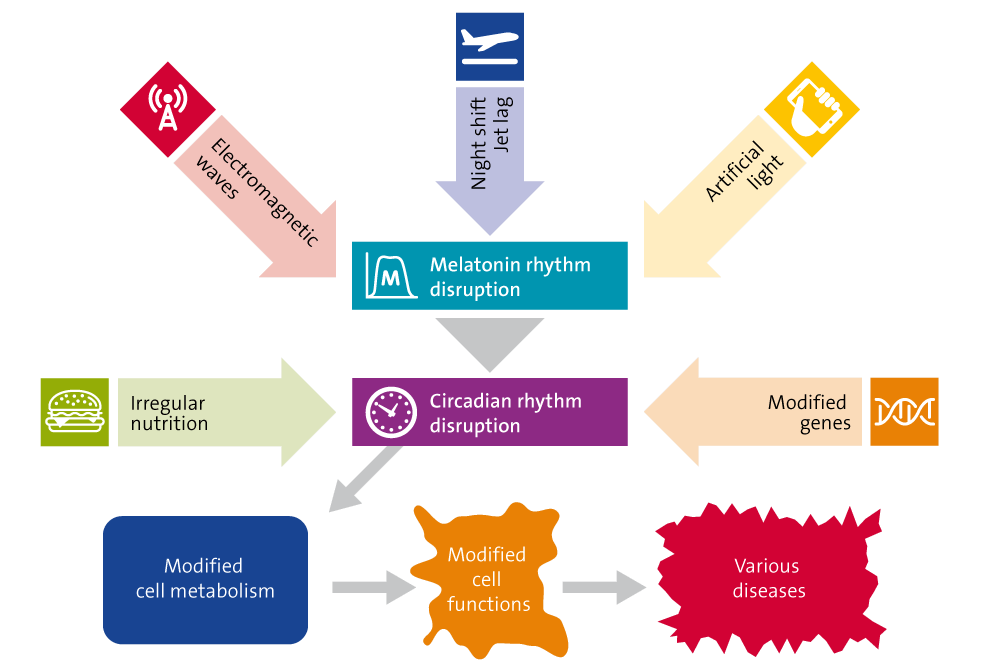Basic Facts
Medical Studies on Melatonin – Basic Facts

Melatonin (N-acetyl-5-methoxytryptamine) is mainly produced in the pineal gland, located in the brain – especially during the night in complete darkness. This is when the melatonin level rises to eight times of the level during the day. This signals to the organism that it is time for the organs and bodily functions to rest, but also to initiate vital repair mechanisms. This makes melatonin the most important internal timer.
Disruptions to cycles caused by light
On the other hand, even the slightest flash of light can affect this critical process, especially the blue light from TVs and smartphones, the light from an alarm clock or street lighting. These everyday appliances have proven to be highly disruptive to our internal cycles and have a substantially adverse impact on our melatonin balance.

Melatonin keeps our internal clock ticking
Each flash of light passes through the retina to reach the suprachiasmatic nucleus (SCN), which is connected to the pineal gland and serves as a control centre and “master clock” for the brain. Melatonin provides the timing for this internal clock, not only letting the brain know that it should switch to “night mode”, but also passing this information on to every other organ and cell in the body. If this natural mechanism is disrupted by light during the night, this has serious consequences not only for the day/night cycle, but also for the function of the organs and the development and course of many diseases.
Every cell contains melatonin
Only recently did it become known that the “powerhouses” of each cell, the mitochondria, are also capable of producing melatonin. This melatonin is not passed into the blood, but rather is used to regulate certain functions in each of the cells. This production is also partly controlled by the melatonin in the pineal gland, meaning that disorders of the pineal gland can also result in changes in how these cells function, which may result in organ damage, for example.
Medical Studies on Melatonin – Basic Facts
Autism spectrum disorder (ASD) is a neurodevelopmental condition characterized by a complex and multifaceted neurobehavioral syndrome. In the last decades,
Intracellular accumulation of the microtubule-associated protein tau and its hyperphosphorylated forms is a key neuropathological feature of Alzheimer's disease (AD).
Compelling evidence has demonstrated the effect of melatonin on exhaustive exercise tolerance and its modulatory role in muscle energy substrates
This commentary summarizes and highlights the recent research reports of the group headed by Professor Wenkai Ren. Their research has
The marked drop in the frequency of Helicobacter pylori infection resulting from the use of antibiotics and potent anti-acid medications
This study examined the reliability of 31phosphorus-magnetic resonance spectroscopy (31P-MRS) to measure parameters of liver metabolic function in the intact
Coronaviruses (CoVs) are a group of single stranded RNA viruses, of which some of them such as SARS-CoV, MERS-CoV, and
Melatonin possesses multi-organ and pleiotropic effects with potency to control angiogenesis at both molecular and cellular levels. To date, many
The role of melatonin has been extensively investigated in pathophysiological conditions, including autism spectrum disorder (ASD). Reduced melatonin secretion has
Cartilage is a relatively simple connective tissue that plays a variety of roles in the human body, including joint support
The regular rise and fall of the sun resulted in the development of 24-h rhythms in virtually all organisms. In
The therapeutic potential of melatonin as a chronobiotic cytoprotective agent to counteract the consequences of COVID-19 infections has been advocated.
Colorectal cancer (CRC) is one of the most common types of cancer worldwide, known as the second leading cause of
Growing evidence shows a link between mood and chronotype. The majority of studies measure chronotype as a preference for morning/evening
Melatonin is an ancient molecule that can be traced back to the origin of life. Melatonin's initial function was likely
The neuromodulator melatonin synchronizes circadian rhythms and related physiological functions via actions at two G protein-coupled receptors: MT1 and MT2.
The available pharmacological modalities for the treatment of fibromyalgia (FM) are associated with a variety of adverse effects and limited
Research indicates that sleep duration and quality are inter-related factors that contribute to obesity, but few studies have focused on
Melatonin inhibits GABAergic neurons in the hypothalamus consistent with a reduction in wakefulness.
Although melatonin is necessary for circadian regulation of sleep, the mechanisms underlying this effect of melatonin are still unclear. In
Humans live in a 24-hour environment, in which light and darkness follow a diurnal pattern. Our circadian pacemaker, the suprachiasmatic